'I survived D-Day - then had my first champagne'
- Published
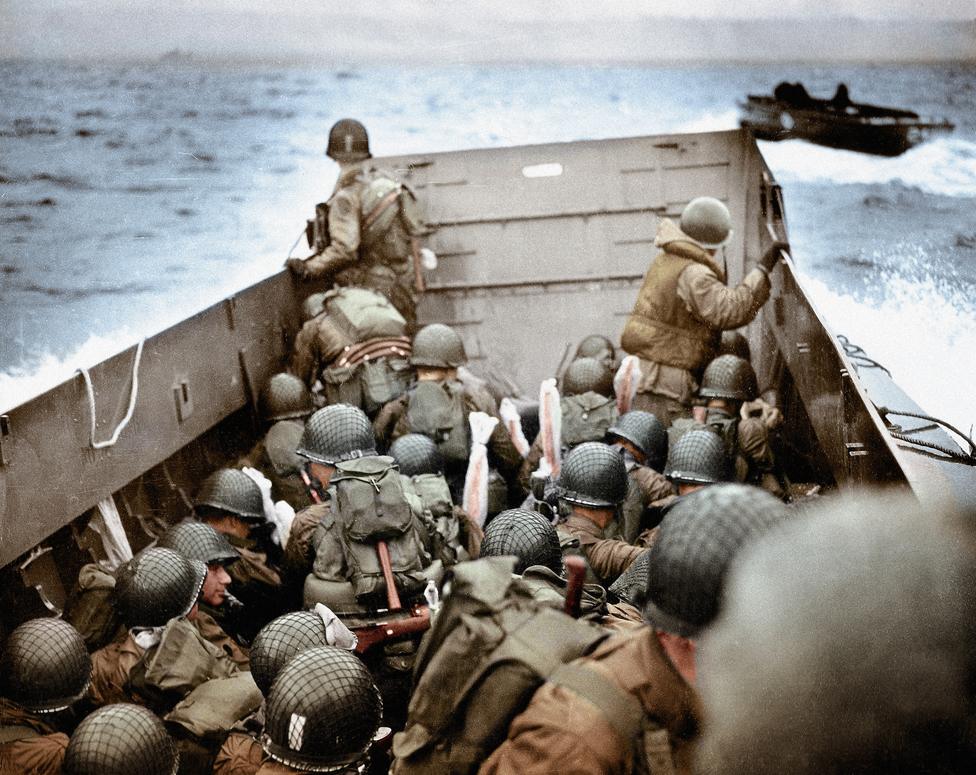

The 75th anniversary of D-Day, when British, American and Canadian forces landed in France to drive out the occupying German army, will be a special one for a dwindling group of people - those who were there at the time. The BBC's Emma Jane Kirby met a US veteran and two French civilians.
What 96-year-old Jake Larson remembers most about D-Day is the feeling of exhaustion. Well, the exhaustion and his first taste of champagne.
"Let me tell you the story!" he says from his home in California as we chat on the phone. "You'll love this story!"
Seventy-five years on and Jake's vintage tales of war are still as effervescent and sparkling as the bubbly he used to knock back in Normandy. For 65, perhaps for 70 years, he refused to speak about his experiences on the French coast - when he left the US Army in 1945, he was demobbed with "the shakes", he says. But when he did allow the cork to pop, suppressed memories frothed and spilled over in Technicolor.
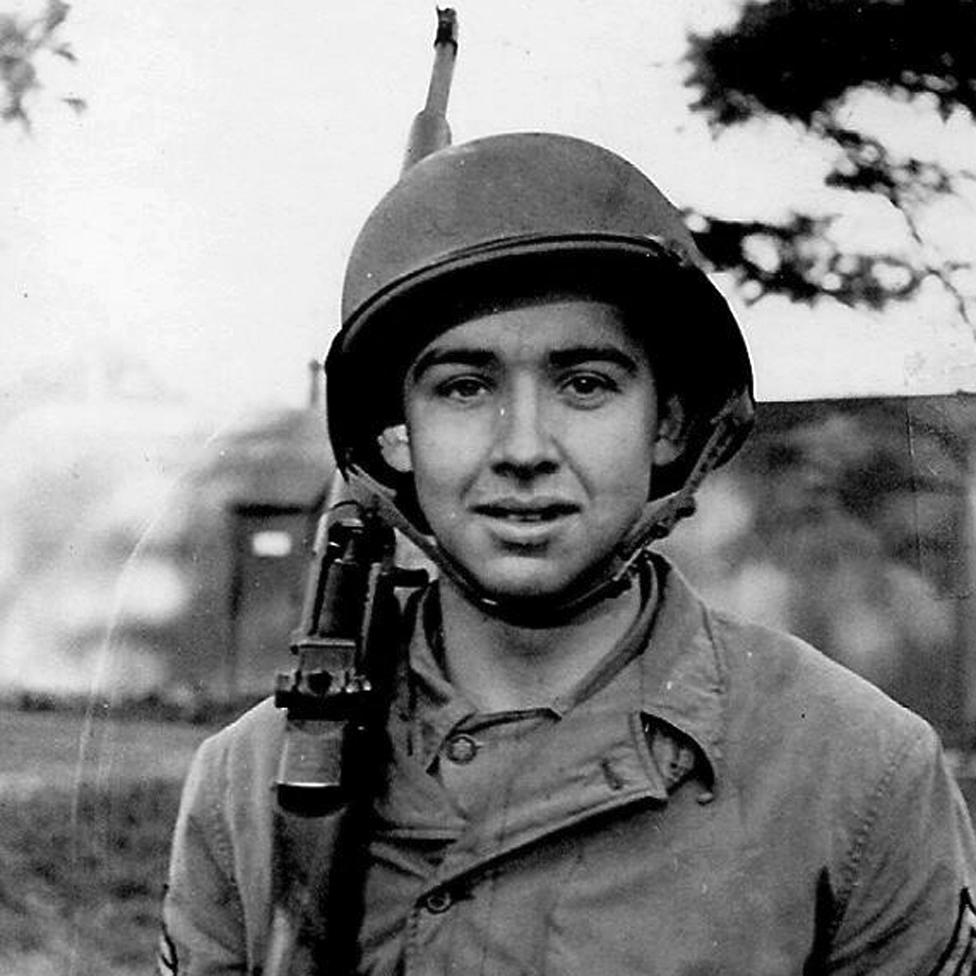
Jake Larson

Jake had joined the National Guard in Minnesota aged 15. He'd lied about his age in the hope he'd get paid there and then - he'd only signed up because he'd wanted 10 cents for a cinema ticket to watch the latest Gene Autry film with his cousin. But national guardsmen were among the first to be conscripted into the US Army, and by 1944 Jake was a sergeant. When someone found out he could type, he was quickly shipped to the US Army's HQ in England to become a clerk, typing up the loading orders for the Normandy invasion plans of the US V Corps.
"Man, I was so tired!" he remembers. "No-one had slept on the 4th or 5th [of June] and the seas were so rough we were turning and turning and everyone was sick. But on 6 June, maybe around 06:30, it was time to go in and here we were landing at Omaha beach with the water up to our necks and machine-gun fire on all sides. It was a shooting gallery."

The sea, he says, was red with the blood of soldiers who had stepped on mines and he recalls having to push floating bodies out of his path to shore. After scrambling up the beach, he hid trembling behind a small sandbank and trying to calm his nerves with a cigarette, he asked the soldier crouched behind him for a match. When the man didn't reply, Jake nudged him and saw there was no head under the helmet.

Find out more
You can listen online to Emma Jane Kirby's interviews with Jake Larson, Thérèse and Pierre le Chevalier, and Leon Gautier
For Radio 4's PM programme she also interviewed British veteran John Graves, a tank driver in the Scots Guards

Time just evaporated that day, Jake reflects. He remembers setting up a command post by the cliffs, digging himself a foxhole to sleep in and by seven o'clock that night he was dropping with fatigue. That's when he was told by his commanding officer that he was to be in charge of the night shift.
The next morning - Jake's longed-for bedtime - the guns roared again and more tanks rolled up the beach.
"I couldn't sleep with that noise!" he protests. "I just couldn't sleep and man, I really needed to rest!"
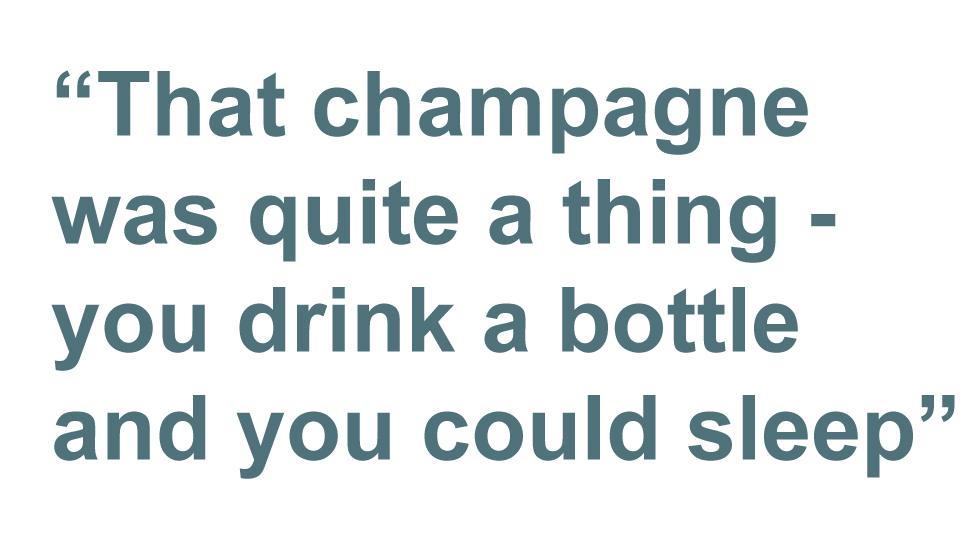
It was the locals who helped Jake out. As he stumbled away from the beach towards the village, French civilians rushed out to greet the liberators, hugging the soldiers and plying them with Normandy cheeses and other local fare.
"There was Camembert!" delights Jake. "Am I even pronouncing that right? It was delicious, that Camembert cheese, but I didn't know how you ate that thing - I was just a farm boy from Minnesota! Then they gave us champagne! Wow! Man! Did you ever drink champagne?"
Jake giggles down the telephone line.
"I used to drink a whole bottle of that champagne every morning! We were out in the open and they (the Germans) were shooting at us and we were shooting back - and the noise! And I needed to sleep! Well that champagne was quite a thing - you drink a bottle of that and you could fall asleep! It was amazing stuff!"

At her home in Angers, 90-year-old Thérèse le Chevalier claps her hands together in delight when I tell her about Jake and his champagne cure for insomnia.
Back in June 1944, Therese was a 15-year-old boarding school pupil, but when a cousin working for the Resistance hinted to her mother that something significant was about to happen on the Normandy coast, Thérèse's mother ordered her home to Bernières-sur-Mer, the stretch of coastline known to the Allies as Juno Beach.
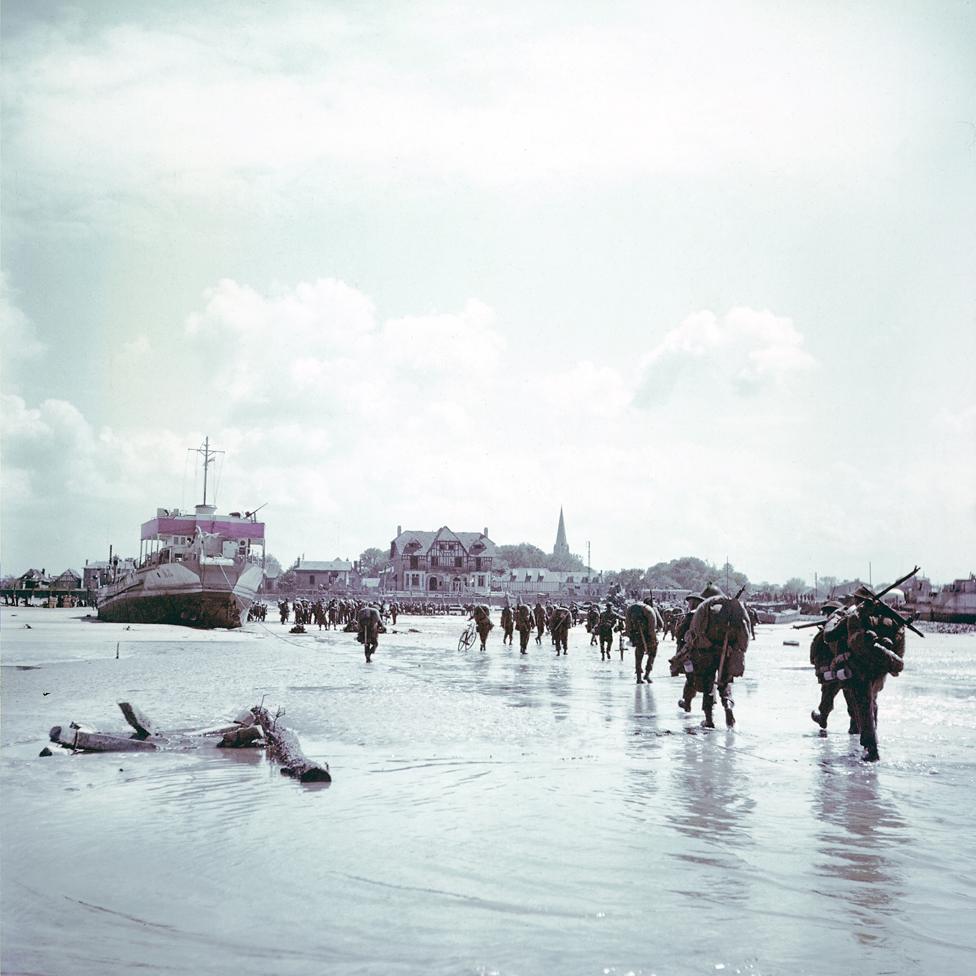
Canadian troops walk ashore at Bernières-sur-Mer

As Jake Larson would have been clutching his stomach and vomiting in the rolling transport ship as he waited to land at Omaha Beach, Therese was hunkered down with her parents and little sister in a trench at the back of her yard, waiting for the ground to stop trembling with the bombing and gunfire. And as soon as it did, they went into the street.
"The joy! The amazing feeling when we saw all those soldiers!" she exclaims. "The first were Canadians and some had their faces blacked up to avoid being spotted. And there were all kinds of weapons coming by, tanks and jeeps!"
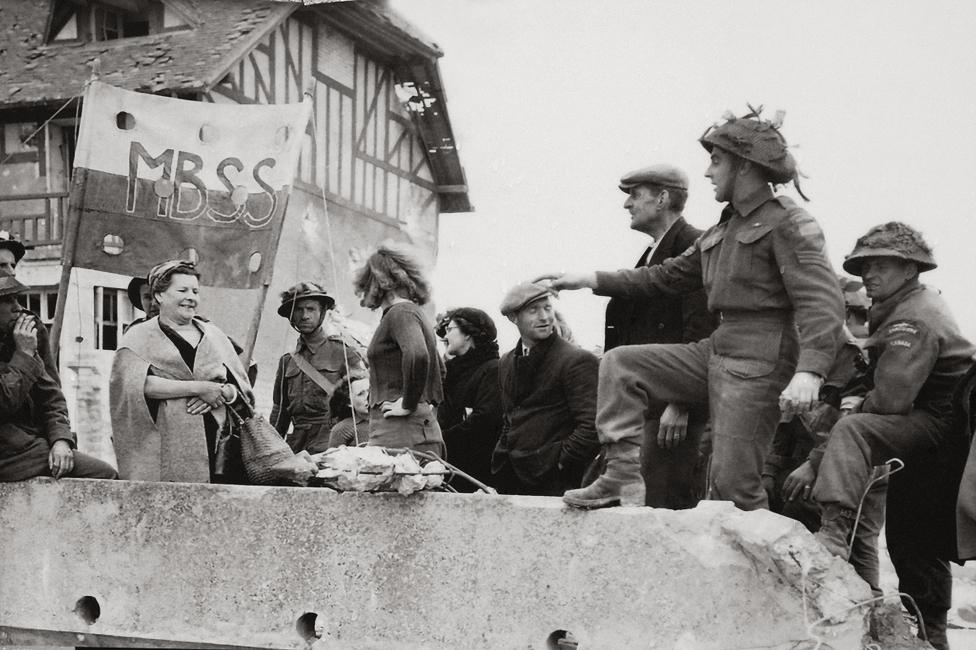
Canadian troops meet the townspeople
Later, while her parents were busy, she and her little sister sneaked away to look at the sea and were startled to find it packed with boats sporting silver anti-aircraft kite balloons.
"It's strange," she reflects. "But I don't remember seeing corpses or anyone injured on the beach. My 15-year-old self did not understand death, did not believe in death, so maybe I just blocked it out."
She does remember being chased away by soldiers who warned her that the beach was dangerous and there were things going on there which were not fit for a child to see.
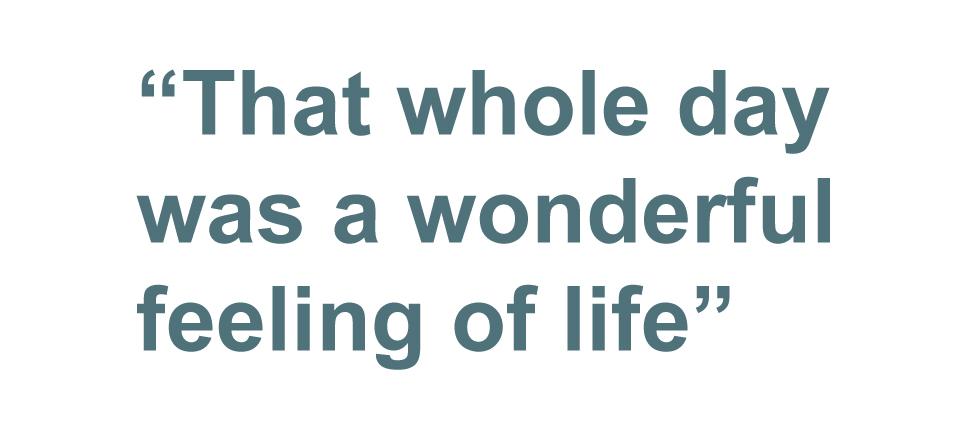
But for the most part, Thérèse sparkles as she speaks of her memories of D-Day and her joy is absolutely infectious.
"Everyone was in the street," she tells me. "They were so happy because first of all we were liberated, we felt free, but really because we were alive! That whole day was a wonderful feeling of life."
Therese's mother opened up her house to the soldiers to welcome them and to try to warm them up.
"Of course, we pitied those poor things," Thérèse says, her hands cupping her face. "Because they were all wet from walking in the sea - oh, we felt so sorry for them! My mother boiled water all day for their tea and we made them coffee." She shakes her finger, correcting herself. "Well we didn't have coffee by then, of course, I think it was barley we gave them."
Thérèse shows me a photograph of herself taken around the time of the D-Day landings and I look at an image of a beautiful, confident young woman with masses of thick, dark hair piled high on top of her head.
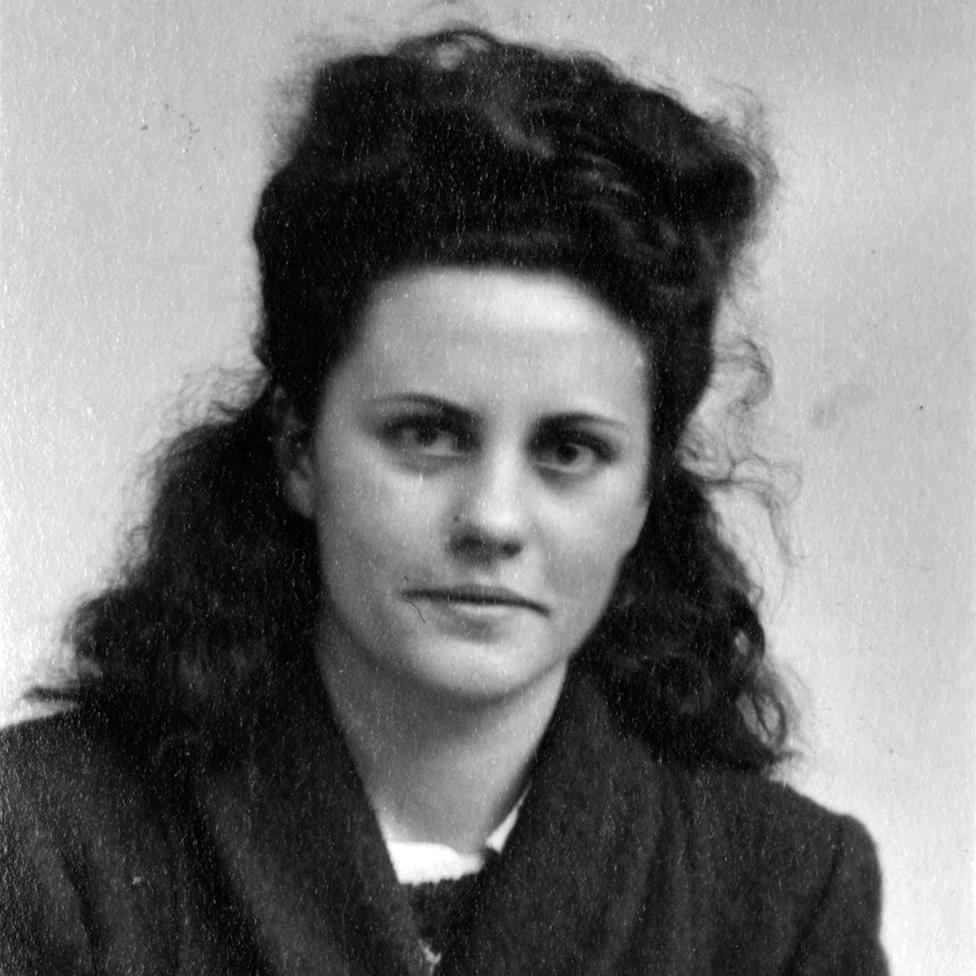
Thérèse Le Sueur, who became Thérèse Le Chevalier

"Oh yes!" she laughs coquettishly. "My hair was my pride, my crowning glory!"
The soldiers were clearly enchanted by this pretty 15-year-old and gave her sweets and biscuits from their rations. But the gift she remembers most clearly is the little tin of chocolate they gave her, which could be heated up as a drink.
Therese closes her eyes in ecstasy as she recalls tasting it, watching the battalions of Canadian and British soldiers.
"Honestly," she sighs, "I never drank such a chocolate in all my life!"
That evening, she says, the soldiers pulled a piano from a bomb-damaged house into the street and one of them played for the village. Thérèse doesn't remember the exact tunes he played but she knows it was something joyful.
"Because we danced!" she laughs. "We danced until the evening came."
While we chat, Thérèse's husband Pierre watches us quietly, occasionally sighing and shaking his head. His experience of the liberation was very different from his wife's because he lived 20km south of Bernières-sur-Mer, at Caen, which would endure a further two months of heavy bombing before the Germans were defeated.

A French liberator
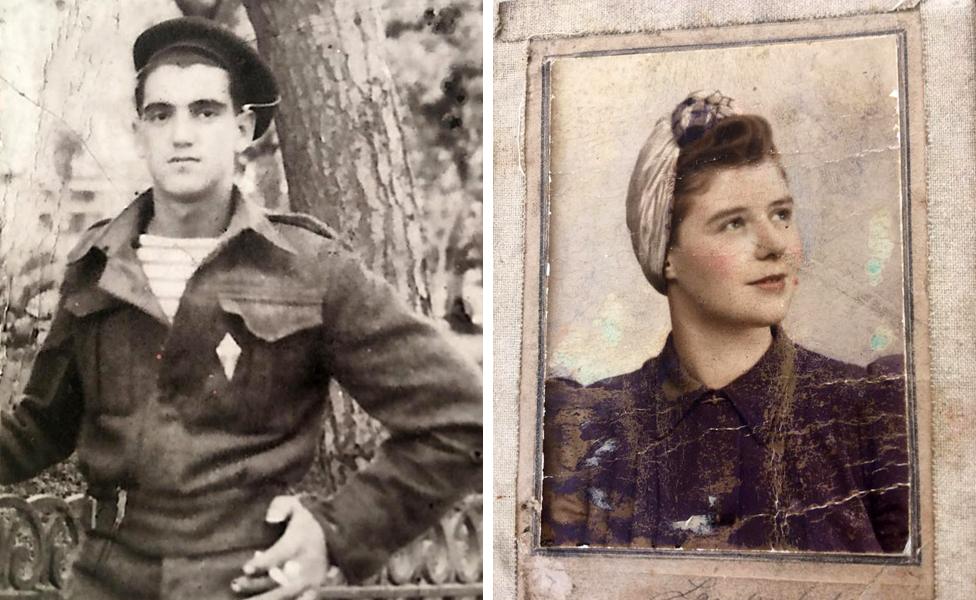
Leon Gautier and the patched-up photo of Dorothea, whom he later married
On 6 June 1944, 21-year-old Leon Gautier was one of 177 elite French commandos who took part in the Normandy landings with the British 4 Commando unit.
He was one of the first men to step on to Sword beach - the British soldiers were "gentlemanly", he says, and allowed the French to land first. He was distraught when the photo of his English girlfriend, Dorothea, got wet in the sea. Later, in a trench, he repaired it with the sticking plaster from his first aid kit.
He remembers meeting a few French civilians near Sword beach and laughing when they presumed he was British and tried to speak to his unit in English. They told him they were scared of repercussions when the Allied forces left. "We will not go back," he told them. "This time it's for good."

The historian Anthony Beevor once described the Battle of Caen as being "close to a war crime", but Pierre does not want to criticise the Allied forces, he just says that life was "very, very hard" for Caen's civilians, who were almost starving by the summer of 1944. For two-and-a-half years, Pierre and his parents slept in their cellar to survive. Many of their friends and neighbours were not so lucky.
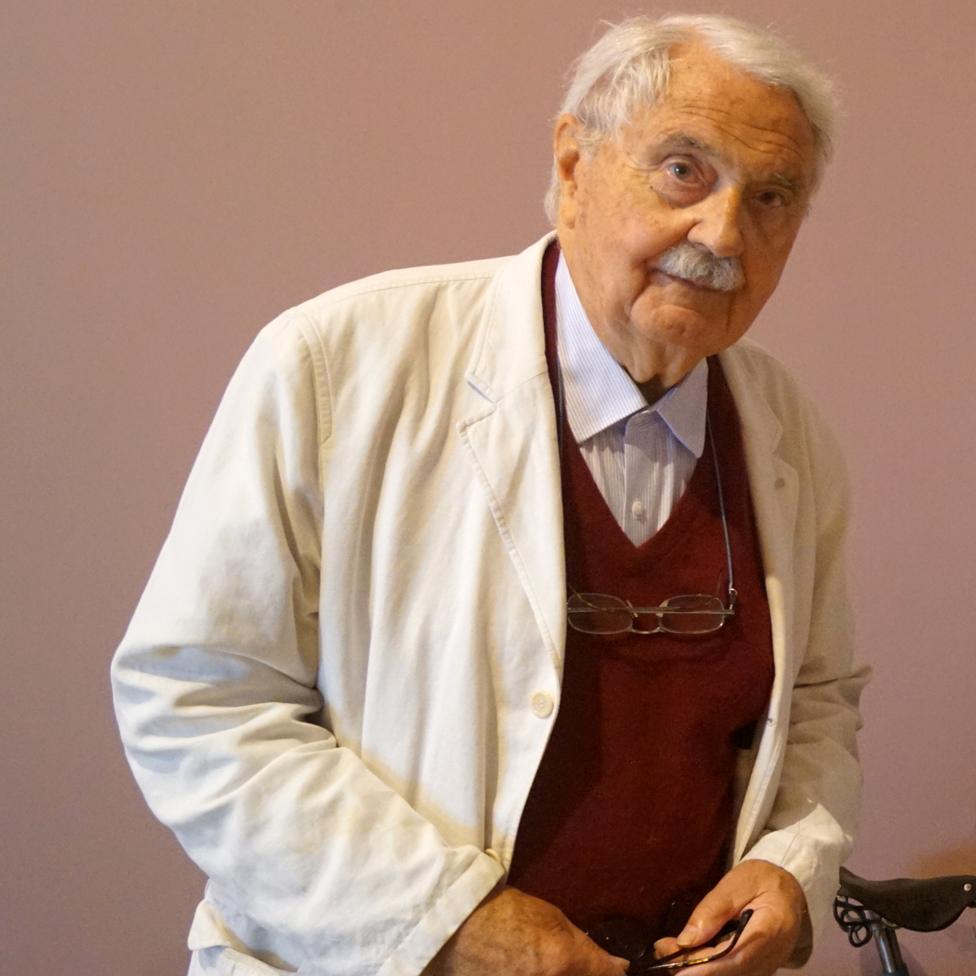
Pierre Le Chevalier

"There were many, many dead at Caen," he reminds me. "And we knew nothing about D-Day. That night (6 June) the bombs fell non-stop. We imagined something might be happening but we didn't know it was accompanied by soldiers landing on the Normandy coast. All we saw were German reinforcements passing by - and, later, trucks returning from the front full of dead soldiers."
Eventually, Pierre's parents decided to evacuate to the countryside.
"The first D-Day soldiers I saw would have been in August," he says. "American soldiers - a battalion of black American soldiers - gave us chewing gum but passed by quickly. We didn't have physical contact or conversation with the Americans. We were liberated without really knowing it." He shrugs.
"And Caen didn't get better from one day to the next. We had no electricity, no water - everything had been bombed to bits."
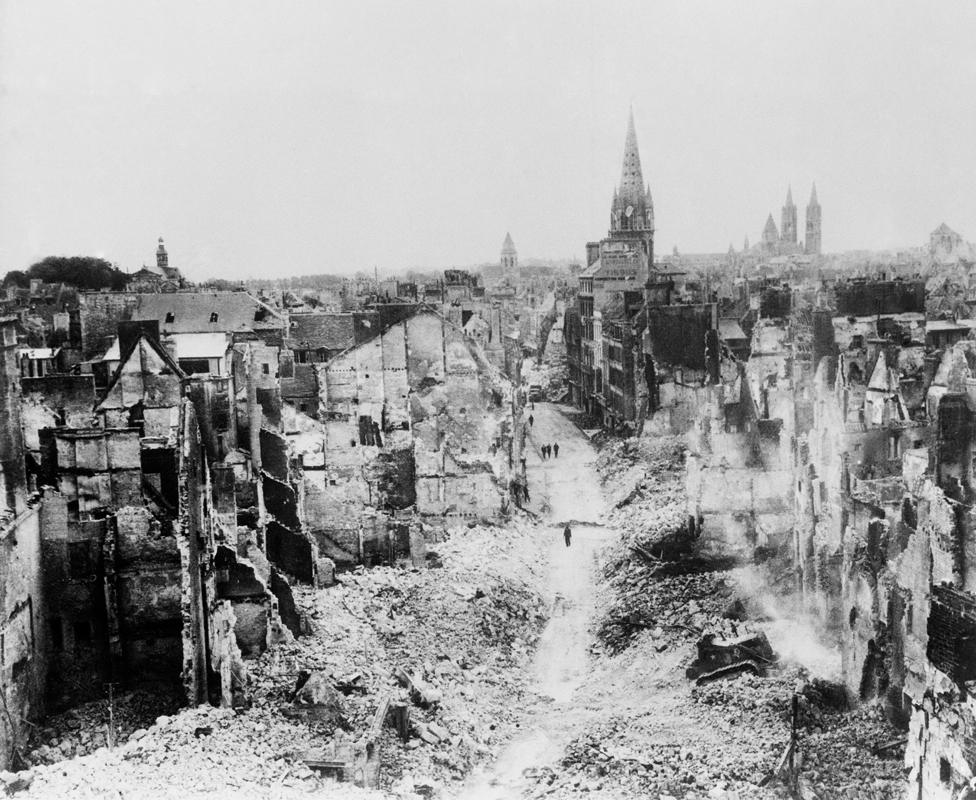
Caen - liberated, and also destroyed
Thérèse has been busy shelling peas for lunch while her husband talks but she comes over to join us now and interjects that while she had the pleasure of seeing the liberation, her husband saw only the war.
Pierre smiles at us sadly.
"There was no joy," he admits. "Even after the ceasefire in 1945, the people weren't spilling over with joy. I don't remember any laughter in the streets. I think mentally, we were all rather crushed."

Pierre and Thérèse will return to Normandy for the 75th anniversary of D-Day just as they have done many times before. And for the first time since the war ended, 96-year-old Jake Larson will be back in France too, to pay his respects at the cemeteries where his fallen comrades are buried.
"I'm the luckiest man alive," he tells me emphatically. "We lost 2,400 men on Omaha beach that day, men I walked over, men who died to spare me." His voice trails off. "There's a feeling of guilt in that," he admits. "So now it's time to pay my respects and to thank them for their sacrifice."
Jake Larson is now the only survivor from his regiment - the "last man standing", as he jokes. Pierre and Thérèse too are painfully aware that in another 10 years there may be only a handful of civilian witnesses like them.
"Young people don't know about D-Day, they don't care about the war," says Thérèse with a wry smile. "To them it's just history. But when you live that history, it's very, very different."
Thérèse Le Chevalier's story is featured in In Their Footsteps, external, an exhibition at the Juno Beach museum, external running until 11 November 2019
Join the conversation - find us on Facebook, external, Instagram, external, YouTube, external and Twitter, external.
